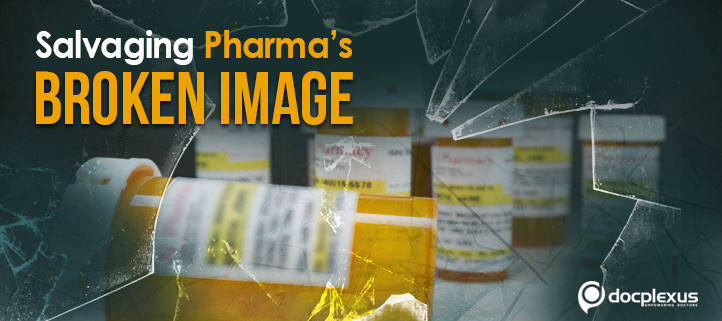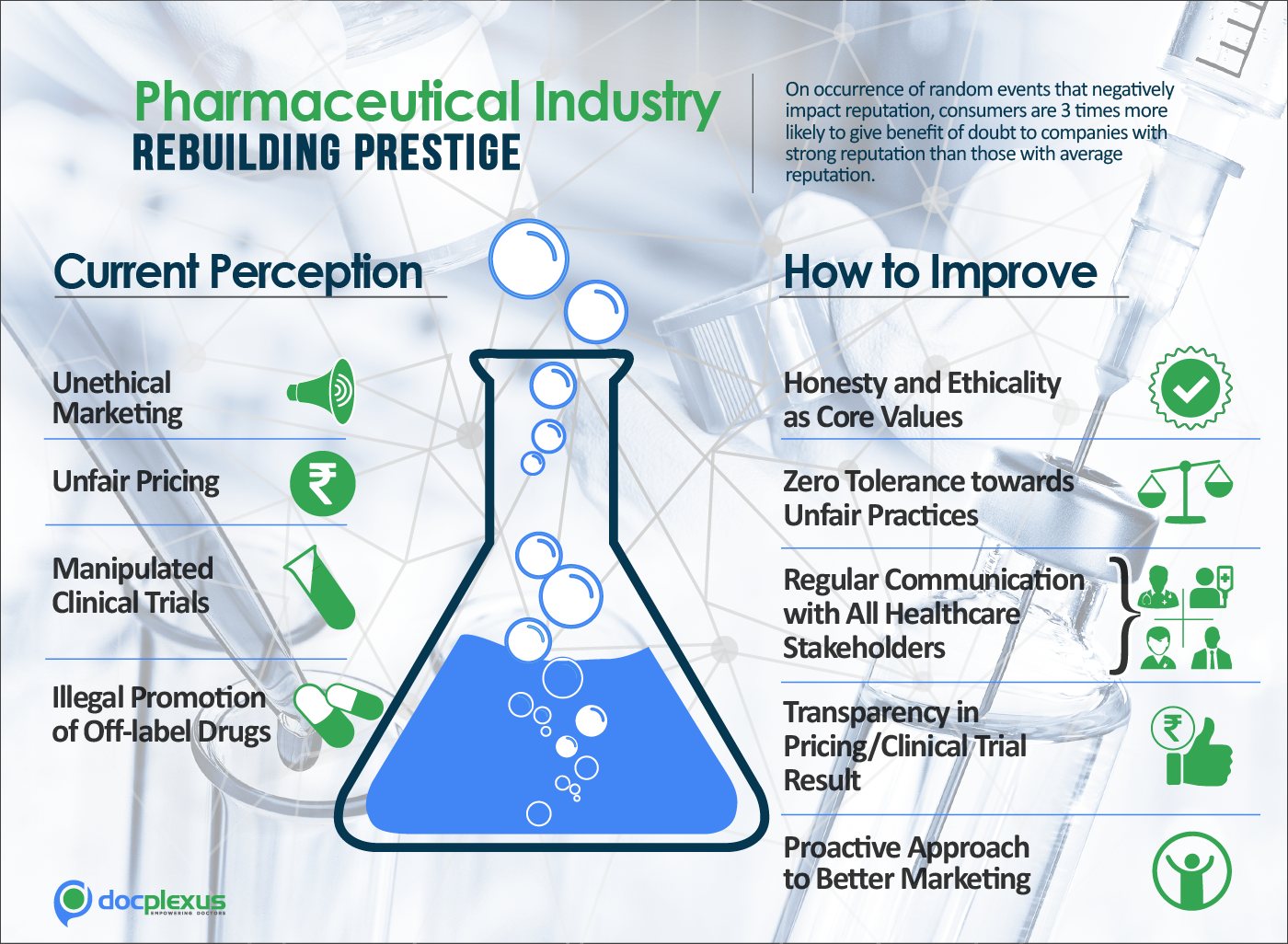
Lawsuits against ethical violations in pharmaceutical sector in the last decade have marred its reputation. Its credibility is further impacted negatively by opaque business practices, esp. on the marketing front. What holds the sector back from addressing the issue and what can be done to improve the situation?
As Pharma’s image continues to take a beating worldwide, it becomes critical to talk about reputation management and unethical practices, both of which have been a cause of concern in most cases filed in the last two decades.
In 2017 itself, the industry made headlines for a number of wrong reasons. Take for instance, the opioid crisis and one Pharma company’s plot to destroy cancer drug to hike prices. Pharma marketing is often equated with enormous monetary compensations to physicians, including sponsored foreign trips and gifts. As many as six drug companies or subsidiaries of the parent generic drug firms from India were accused of violating American federal securities laws and anti-trust law in over a dozen class action lawsuits. While one can argue these cases are few and scattered, it is difficult to argue they haven’t projected the entire industry in poor light.
What sort of impact have these cases had? To start with, they have tainted the stakeholder perception. Even the most genuine efforts towards bettering healthcare are now taken with a pinch of skepticism.
The nature of products complicate things further. While the need to make profits to keep investors happy is paramount in any industry, ‘’near-philanthropic’’ expectations from drug companies are in direct opposition. This conundrum makes it all the more important for Pharma to take reputation management seriously and make communication supreme.
Dominant views on Pharma reputation:
-
Ineffective/low quality drugs that offer short term benefits:
This is perhaps the largest worry among both prescribers and consumers and claims such as those made by Central Drug Standard Control Organization stating that about 4.5%of the drugs in the Indian market are substandard do not help. There have also been quite a few concerns regarding the conditions in which drugs are manufactured. Very recently licenses of 4 pharma companies by Food and Drug Administration over violation of Good Manufacturing Practices norms on minimum requirements for methods, facilities, equipment, personnel and control activities used in the manufacturing, processing and packaging of therapeutic product. All this coupled with the feeling that drug companies charge a bomb only inspire distrust in the consumers.
-
Lack of transparency in all corporate activities:
From marketing to conducting clinical trials and revealing results for public scrutiny, Pharma is facing fire from all quarters for being secretive and even manipulative. Allegations range from opaque pricing to orchestrated trial outcomes, negatives underplayed, positives highlighted.
-
Unfair pricing:
Pharma is notorious for pricing their products exorbitantly to gain unseemly high profits at the cost of access and affordability to those who need it the most. This is precisely the kind of thinking that hurts marketing interests in the long run by creating deep fault lines in relationships.
-
Inappropriate marketing of drugs:
This is so broad an issue, they came up with regulation via legislation – Sunshine Act in the U.S.A., Transparency Code in Europe and so on and so forth. The Indian equivalent is UCPMP code, a set of guidelines that is voluntary at present and which the government is trying to legalize. That pharma believes prescription loyalty can be bought is so rampant a notion that even companies putting in earnest efforts at bringing openness and ethicality to marketing face skepticism. This is not all. Hiding crucial information on side-effects and off-label usage is another issue that shows the industry in poor light. Read here about ethical Pharma marketing.
Fixing Pharma’s broken image:
To gain back lost prestige, the industry as a whole should understand reasons behind negative image, most dominant ones being poor efforts at providing information about drug development and ancillary processes such as pricing and impact, and coming forward to counter the disparaging portrayal in mainstream media. Here is how to address the subject at hand:

-
Honesty and ethics to be adopted as core values:
Customers treated ethically spread the word and that’s the best kind of marketing. These customers become brand loyalists, come back for more, make referrals. Business blossoms as a result. The reverse is what brings most companies down. Lie and manipulate and the day won’t be far when the same forces shame you. Therefore, it is important for leadership to step-up and lead by example, show zero tolerance to unfair practices by taking strict action against defaulters. Have an ethical stance and communicate it clearly to your employees. The message should also be communicated to the rest of the world in a clear, unbiased and informative manner.
This is something we have been advocating and practicing at Docplexus in the area of pharma-physician communications. We not only help in creation of crisp, relevant, neutral content but also monitor engagement and encourage dialogue between parties. This is a major reason why over 25 pharma companies choose us as their doctor communications partner.
-
Rethink communications for target audience:
If there is one thing that the new rules of marketing have been telling us repeatedly, it is that don’t tell your audience what to do. Educate them enough to be able to do what’s right for them. Create an experience. Nothing compares to an experience you take home. A sales pitch can be forgotten. Be it doctors or patients, seek to add value to their knowledge, lives and all your initiatives would fall in place. Make use of digital. From designing CMEs and educating on molecules to organizing webinars and allaying fears and curbing false rumors during crisis situations like scandals and controversies, it is a boon. You can reach out to your audience instantly. Keep them engaged with your brand and work. Read here about the need to move beyond selling and creating experience.
-
Knowledge is the panacea for distrust:
Distrust is a direct outcome of not knowing, of uncertainty. You alleviate this and apprehensions are calmed. This is the reason why good business sense always takes us towards transparency. For Pharma, it becomes all the more important. Let them be open to scientific scrutiny. GSK allows access to outside scientists to probe all the data it holds on clinical trials. Pfizer has been releasing information on physician payments since 2010. It shouldn’t be difficult if there is nothing to hide. There shouldn’t be anything to hide if there is nothing shady happening. By releasing this information, this is the message we convey to our consumers- that they can trust your name because you care.
-
Create a participative environment for all stakeholders:
While doctors are no doubt the center of Pharma universe, it is time to include NGOs, community activists, online patient communities and media in the dialogue. Respond to their queries, even though not every probe would be worth the buck. It is time to bring forth the good side of Pharma because that has been behind the scenes for too long now. Talk about how life saving drugs are developed and why they are priced the way they are and about the philanthropic work companies undertake. There is a negative discourse out there and it is important to highlight the other side, to present the counter-argument without being defensive.
-
Mobilize employees as brand ambassadors:
Inside-the-company perception is much better than outside because employees see how the company gives its 100% to ensure the best solutions possible. Let them be ambassador for your company. No one knows about the work done and ethics followed better than your employees and therefore they are the best people to talk about it all. Keep an elevator pitch ready for times when they engage with stakeholders, even if it is a personal unofficial meet-up. There is no harm saying, “Hey, what you know is incomplete and my company also does A,B,C and this is how we ensure best outcomes.”
Strong positive reputation is perceived as an ability to provide more value, which often allows businesses to charge a premium. The market believes in the potential of such companies to deliver sustained earnings and future growth. Assets such as brand equity, intellectual capital and goodwill are more important to businesses than ever because 70-80% market value comes from these hard to assess intangible assets.
Besides, it is observed that companies with stronger reputation are 3x more likely to receive supportive behavior in terms of gaining benefit of doubt when events such as on-going lawsuits are plaguing the industry and unfavorable opinions such as those made by President Trump in 2017 on drug companies getting away with murder (because of pricing products too high) have potential to cause dip as much as 3-5% in stock prices.
To conclude, would like to quote Warren Buffet, “It takes 20 minutes to build a reputation and 5 minutes to ruin it. If you think about that, you’ll do things differently.” Focusing on building and maintaining reputation at all time and not just when crisis hits insulates companies from greater losses.
